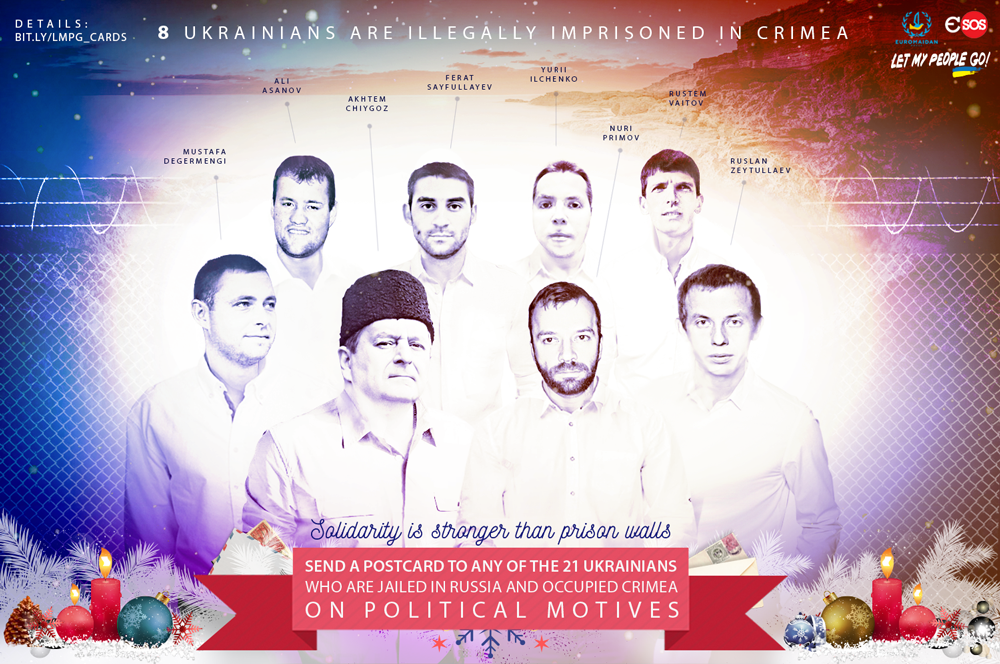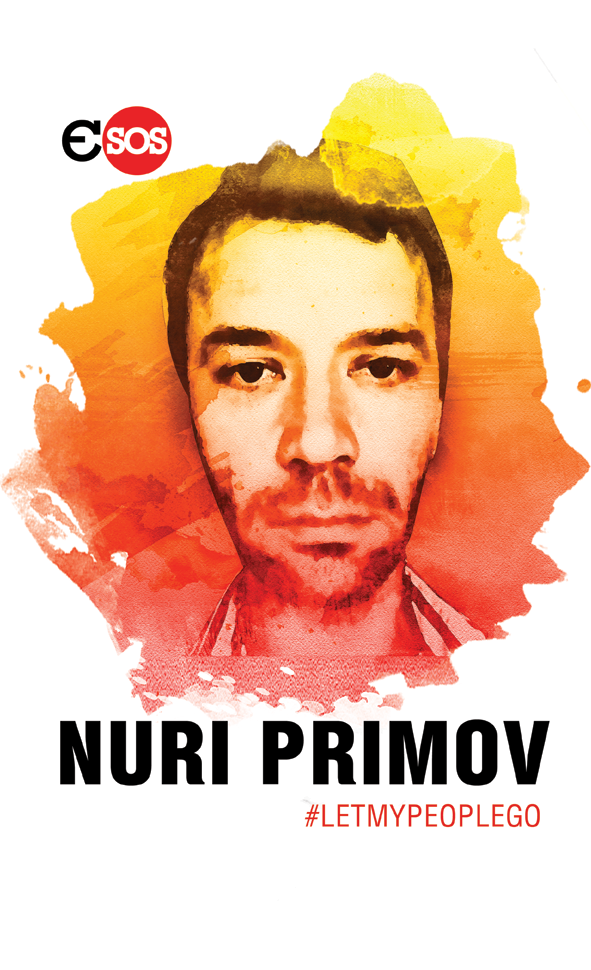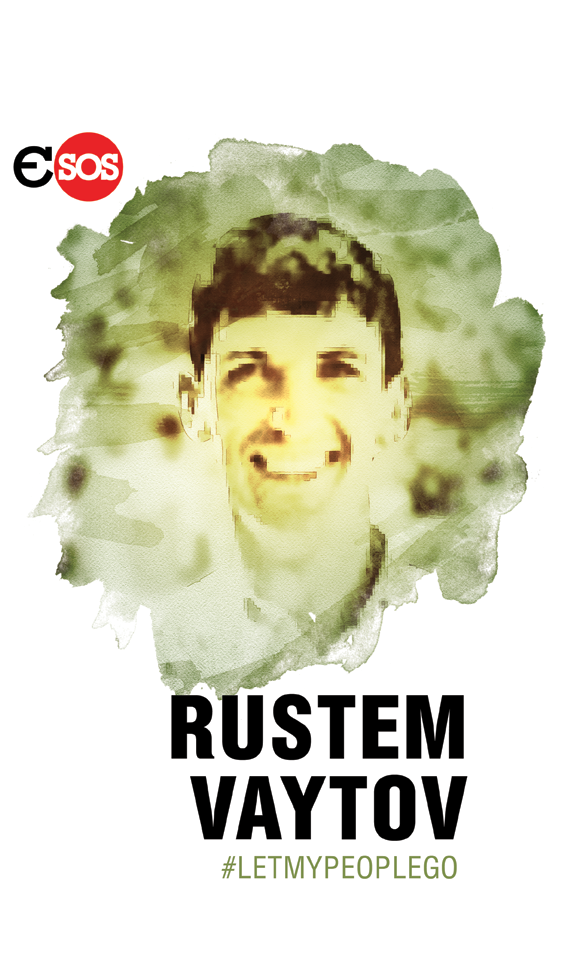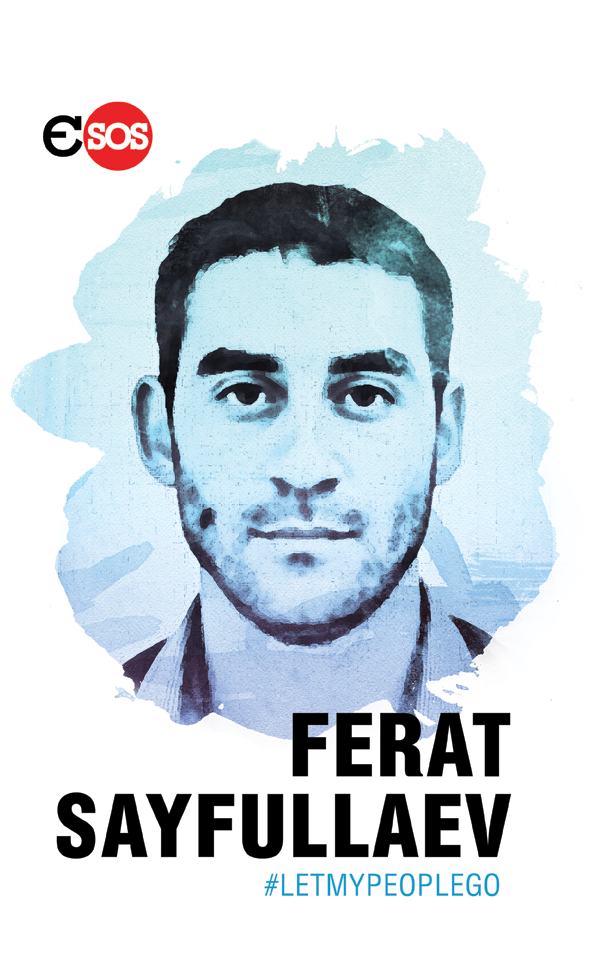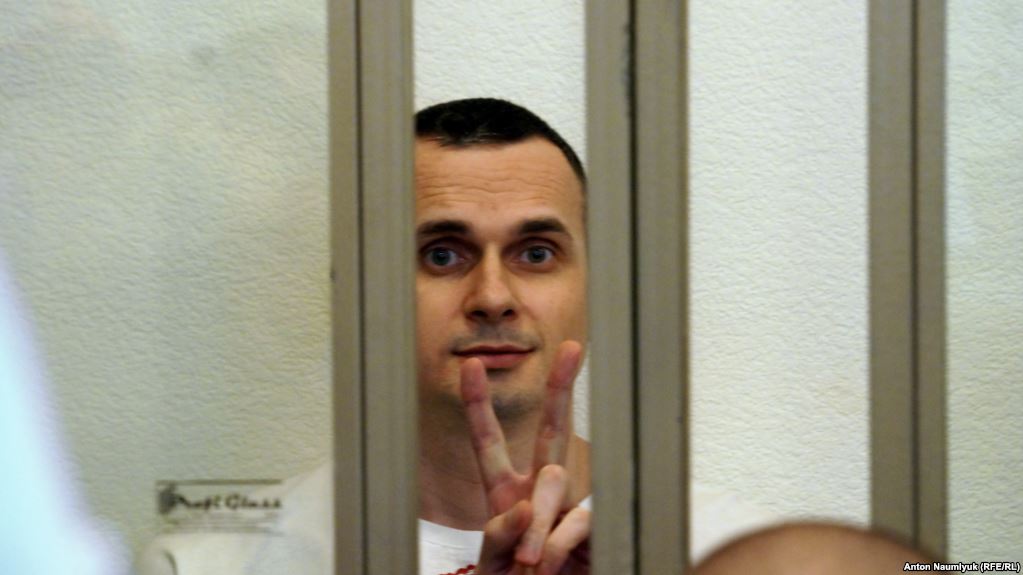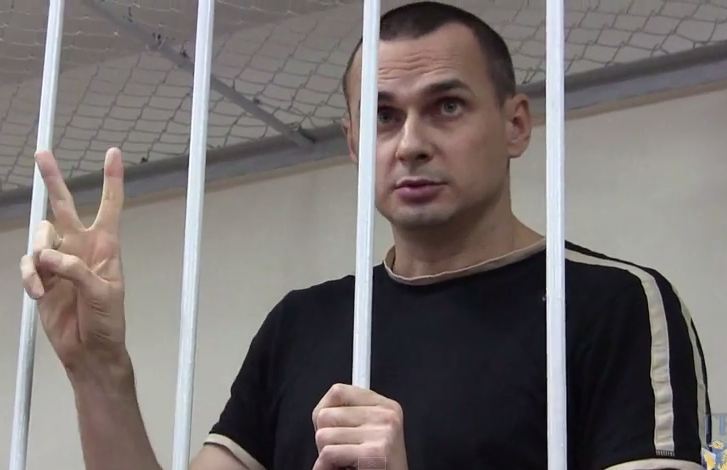After Russia illegally annexed the Crimean peninsula in a referendum condemned by a UN General Assembly resolution, it has silenced, attacked, and harassed its critics, turning the former Autonomous republic of Ukraine into a “peninsula of fear,” according to human rights groups. Russia’s dangerously broad “anti-extremist” legislation has been used against Crimean Tatars and other Ukrainians who oppose Russia’s occupation of their homeland. Crimeans have been arrested on the accusation of “extremism” for holding a Ukrainian flag, and the representative organ of the Crimean Tatars, the Medzhlis, is also in danger of being banned for “extremism.”
As a result, there are eight Ukrainians imprisoned in occupied Crimea on political motives, according to the Let My People Go Campaign.
[mwm-aal-display]
Jailed for criticism of Russia’s occupation of Crimea
Yurii Ilchenko
37 y.o., foreign language school director, blogger.  He was arrested on 2 July 2015 in Sevastopol on suspicion of “extremism,” being accused of opposing the Russian occupation of Crimea and Russia’s war in Donbas on his blog. Ever since he is being held in pre-trial detention in Simferopol.
He was arrested on 2 July 2015 in Sevastopol on suspicion of “extremism,” being accused of opposing the Russian occupation of Crimea and Russia’s war in Donbas on his blog. Ever since he is being held in pre-trial detention in Simferopol.
It’s unclear what article of Russia’s criminal code he will be incriminated of violating. Initially, media reports informed that Russia’s investigative committee was dealing with the case, meaning that Ilchenko is being accused under article 282, “inciting hatred or enmity.” Later, reports appeared that the case is being handled by the FSB, meaning that the blogger is accused under article 280 – public calls to extremism. Apart from that, the FSB is trying to accuse him of “pedophilia.” Special services installed a hidden camera in his school, which recorded Yurii kissing a 12 y.o. girl. Yurii’s relatives said that he is friends with the mother of the girl. Later, it became known that the special services forced the mother of the girl to write a denunciation on Ilchenko. They also attempted to accuse him of “terrorism” through a provocation. A week before the arrest, a woman that Mr.Ilchenko didn’t know walked up on the street to him and proposed for him to spread leaflets in Sevastopol with calls to oppose the occupiers and cause explosions. Ilchenko refused.
At the end of July 2015, the Crimean human rights activist Oleh Sofianyk informed that, according to his information, Ilchenko is being tortured, claiming that he is being beaten, has a broken spine, damaged kidneys, and may not last till the court hearing.
Jailed for participating in a pro-Ukrainian demonstration

After disgraced Ukrainian president Yanukovych fled Kyiv on 22 February 2014 following the Euromaidan revolution, pro-Russian rallies started taking place in Crimean cities; the next day, a “people’s mayor” was elected in Sevastopol, opening the gateway for a Russian takeover of government. On 26 February, a rally for Ukraine’s unity held by Crimean Tatars took place in Simferopol. They were trying block the Crimean Parliament from passing a resolution on separating from Ukraine. A smaller rally of pro-Russian organizations was being held at the same place. Clashes erupted as a result of poor work of the police, as a result of which 30 people suffered injuries, and two subsequently died. As reported by human rights activist Halya Coynash, all representatives of the Mejlis seeking only to calm the crowd and prevent bloodshed. Yet it is only Crimean Tatars who have been prosecuted, more than a year after the incident. The prosecutors were so short of material that they even invited Simferopol residents with absence of bodily injuries to come forward and testify about force being used against them.
See more: Chronology of the annexation of Crimea
Three Crimean Tatars are being remanded in custody, being accused by Russia’s criminal code of participating in “mass disorders” in an “unsanctioned demonstration” – a legal absurdity, as the rally 26 February took place before Russia’s so-called “referendum” of 16 March 2014, on the territory of Ukraine governed by Ukrainian law, where demonstrations do not have to be sanctioned by the authorities. All the detainees deny taking part in “mass disturbances,” while not denying the fact of taking part in the demonstration.
One person has already been sentenced as a result of this case – the cameraman of Crimea’s only Crimean Tatar channel ATR Eskender Nebiyev, who was sentenced to 2.5 years of jail but was released on probation. The ATR channel was shut down on 1 April 2015, following at least two statements of the self-proclaimed “governor” Sergey Aksyonov in which he considered the only Crimean Tatar television channel to be a hostile element giving people hopes that Crimea might become Ukrainian again. Also imprisoned but released on bail were Eskender Kantemirov, Eskender Emirvaliiev, Taliat Yunusov.
Three Crimean Tatars had been imprisoned at the beginning of 2015 and are being jailed to this day, all of them Ukrainian citizens who have not adopted Russian citizenship forced on most Crimeans after the illegal annexation.
Akhtem Chiygoz
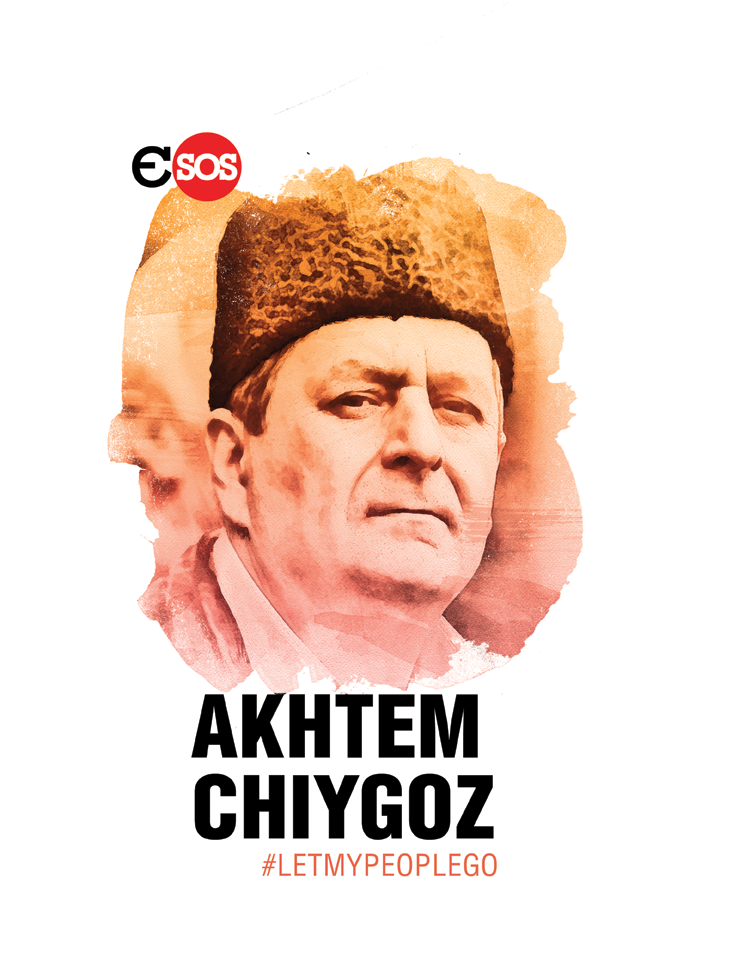 A Crimean Tatar, Deputy Chairman of the Mejlis of the Crimean Tatars, was born in 1964, detained on 29 January 2015. He is being accused of organizing “mass disturbances” on 26 February. The prosecution has had trouble in finding accusations for Chiygoz. It appears that the other two Crimean Tatars are being held in custody for the sole reason of extracting false testimonies against Akhtem Chiygoz. Speaking in court on 17 November 2015, he called his arrest a commissioned political prosecution and its purpose being “to put Crimean Tatars in their place.” He also said that “there is great terror underway in Crimea” against his compatriots, and that the so-called “case” over which he was being held in isolation is a farce for which there are neither grounds nor proof, with “judges passing rulings as dictated by the punitive bodies.”
A Crimean Tatar, Deputy Chairman of the Mejlis of the Crimean Tatars, was born in 1964, detained on 29 January 2015. He is being accused of organizing “mass disturbances” on 26 February. The prosecution has had trouble in finding accusations for Chiygoz. It appears that the other two Crimean Tatars are being held in custody for the sole reason of extracting false testimonies against Akhtem Chiygoz. Speaking in court on 17 November 2015, he called his arrest a commissioned political prosecution and its purpose being “to put Crimean Tatars in their place.” He also said that “there is great terror underway in Crimea” against his compatriots, and that the so-called “case” over which he was being held in isolation is a farce for which there are neither grounds nor proof, with “judges passing rulings as dictated by the punitive bodies.”
Aly Asanov

A Crimean Tatar, born 1982, detained on 16 April 2015. He worked as a farmer, being the breadwinner for a family of three children, with the fourth child being born after his arrest, his wife, and an ailing father. He was not an activist, all his time being consumed by supporting his family, with whom he lives in a poor region of Crimea, and for whom Asanov’s continued detention is catastrophic, according to Halya Coynash. His defense claims the absence of corpus delicti in his actions. Asanov and his family have reported from the outset that he was clearly told that he would be freed if he denounced Chiygoz, and it appears that the only reason for holding him and Dekhermendzhi in custody is to try to wrench a testimony against the Crimean Tatar leader Chiygoz. The court in April argued that it was necessary to “check that Asanov is not implicated in other crimes, including of an extremist nature,” and that he was charged with a serious crime carrying a sentence of 3 to 8 years.
Mustafa Dekheremendzhi
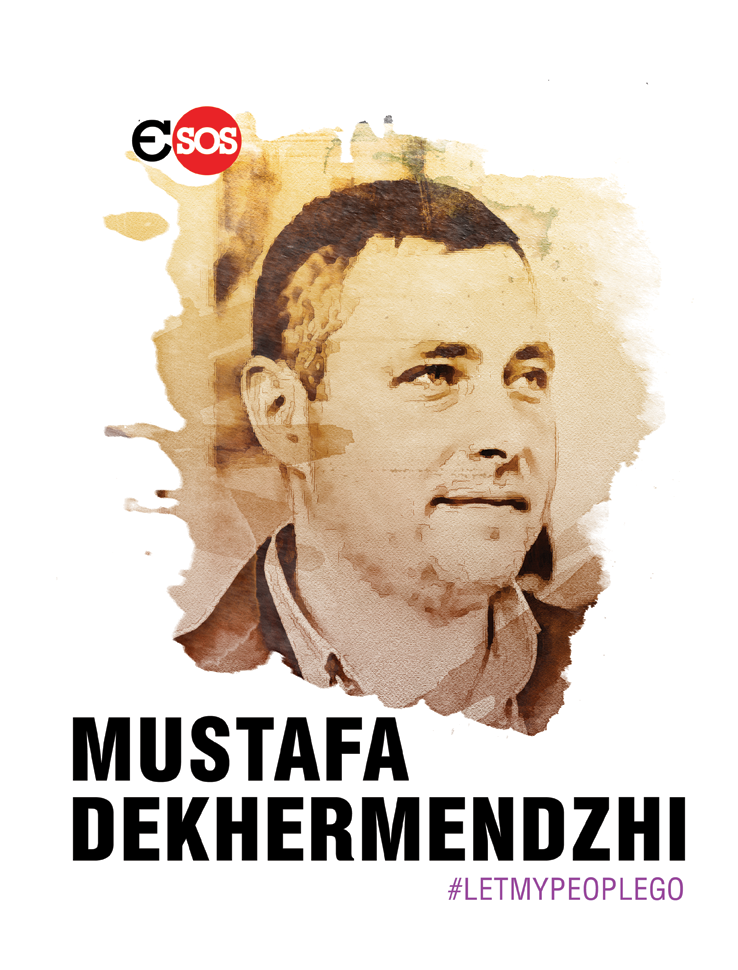
A Crimean Tatar, born 1989, detained on 7 May 2015. Like Chiygoz and Asanov, he is accused of participating in mass disorders. The main proof of the prosecution of his guilt is a video where Mustafa figures. The defense claims that the video was filmed long before the start of the clashes from both camps of the demonstration. Zair Smedlyaev, head of the Crimean Tatar Qurultay Central Election Commission, assessed Dekhermerdzi’s detention by saying that his only “guilt” is refusing to testify against Akhtem Chiygoz. Dekhermendzhi’s appeal against baseless detention was heard and rejected on 28 August 2015.
Persecution for religious beliefs
Four Crimean Tatars are imprisoned on the accusation of organizing and participating in the organization Hizb-ut-Tahrir, which is recognized in Russia as a terrorist organization and are facing from 5 to 20 years of imprisonment or a life sentence. Hizb-ut-Tahrir operates without obstacles on the territory of unoccupied Ukraine, carrying out religious, political, and educational activities. The organization is not considered to be extremist by standards of democratic societies; despite this, after the occupation of Crimea, Hizb-ut-Tahrir was prohibited, and thousands of its members are facing prosecution. As reported by Halya Coynash, the respected Memorial Human Rights Center has pointed out that Russia’s Supreme Court in 2003 prohibited Hizb-ut-Tahrir as “terrorist” without any evidence for its supposedly terrorist activities, calls this obvious grounds for considering the decision to be unwarranted, and has listed those prosecuted for participation in the organization as political prisoners.
Human rights lawyer Emil Kurbedinov, who defends Ruslan Zetullaiev after being illegally prevented from representing the interests of all four, insists the absence of corpus delicti in his client’s actions. Furthermore, he claims that there is no evidence that all of the men were even members of Hizb-ut-Tahrir, nor that any of them committed any crimes.
Ruslan Zeytullaev
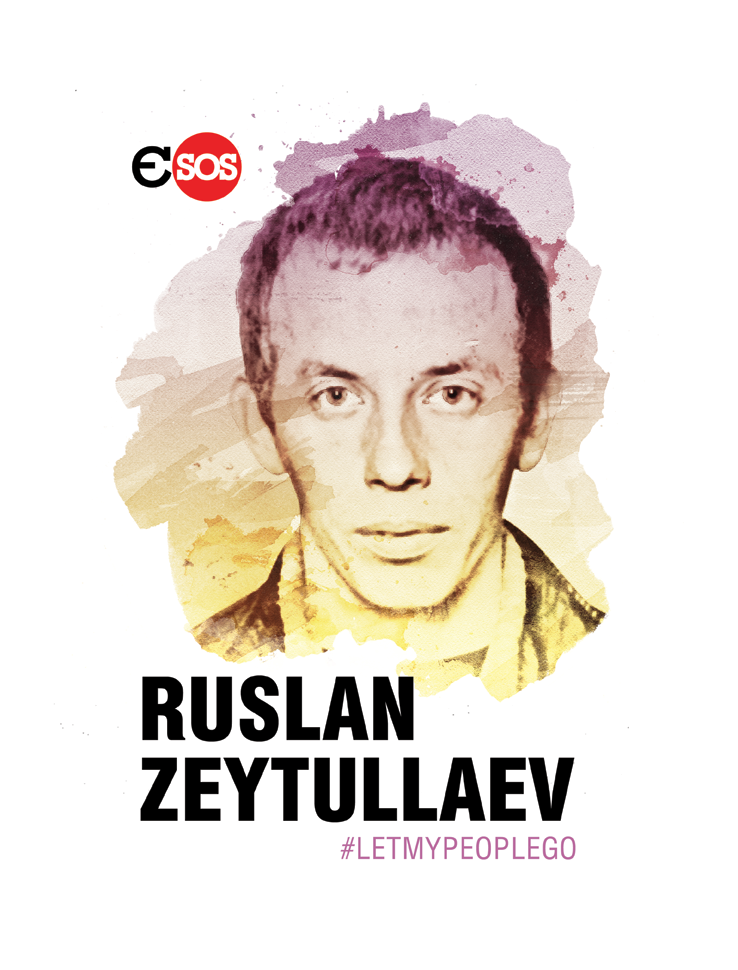 A Crimean Tatar, born 1984, was detained on 21 January 2015. The father of 3 small children is being accused of organizing Hizb-ut-Tahrir, what only Russia calls a terrorist organization, and is facing a sentence of up to 15 years. As reported by Halya Coynash, the FSB turned up at Zeitullaiev’s home at 6 a.m. His wife Meryem first went to the door, and called her husband after hearing that some neighbors were in difficulty and needed help. Unsuspecting, he came and opened the door, and was then forced to the floor, had his hands tied, and was then taken away.
A Crimean Tatar, born 1984, was detained on 21 January 2015. The father of 3 small children is being accused of organizing Hizb-ut-Tahrir, what only Russia calls a terrorist organization, and is facing a sentence of up to 15 years. As reported by Halya Coynash, the FSB turned up at Zeitullaiev’s home at 6 a.m. His wife Meryem first went to the door, and called her husband after hearing that some neighbors were in difficulty and needed help. Unsuspecting, he came and opened the door, and was then forced to the floor, had his hands tied, and was then taken away.
Nuri Primov, Rustem Vaytov, Ferat Sayfullayev
Nuri Primov, born 1976, and Rustem Vaitov, born 1985, were also detained on 21 January 2015; Ferat Saifullaiev, born 1983, was detained on 2 April 2015.
They are being charged with participation in Hizb-ut-Tahrir.
A dangerous tendency to prosecute any Crimean Muslims on religious grounds is becoming systematic in Crimea. According to some observers, any Crimean Muslim is under danger of prosecution by Russian special services in this way: this practice was already used in the Caucasus, where the media image of terrorists/extremists was created out of representatives of a specific nationality.
More about abuse of Crimean Tatars in occupied Crimea: Crushing dissent. Timeline of repressions against Crimean Tatars in occupied Crimea
Send a holiday postcard to Ukrainian political prisoners
Join the holiday marathon of the #LetMyPeopleGo campaign and send a postcard and a letter to the 21 imprisoned Ukrainians. 8 of those featured here are jailed in occupied Crimea, 13 more are imprisoned in Russia. Many have gone through torture, some have been sentenced to decades of prison.
More about the 13 Ukrainians imprisoned in Russia: #LetMyPeopleGo: free Ukrainian political hostages illegally jailed in Russia
Follow the instructions in this post or visit the fb event:
https://www.facebook.com/letmypeoplegoukraine/photos/pcb.1639462039675257/899928316781808/?type=3&theater
The campaign is supported by a number of organizations in Ukraine and abroad: Centre for Civil Liberties, the Kharkiv Human Rights Group, People in Need, the “Open Dialogue” Foundation, Euromaidan Press, Euromaidan-Warsaw, the Ukrainian Helsinki Human Rights Union, and the Ministry of Foreign Affairs of Ukraine and Commissioner for Human Rights. Follow its English page on fb:
https://www.facebook.com/LetMyPeopleGoUkraine.en/photos/a.1675722242668873.1073741839.1559756634265435/1675722289335535/?type=3

